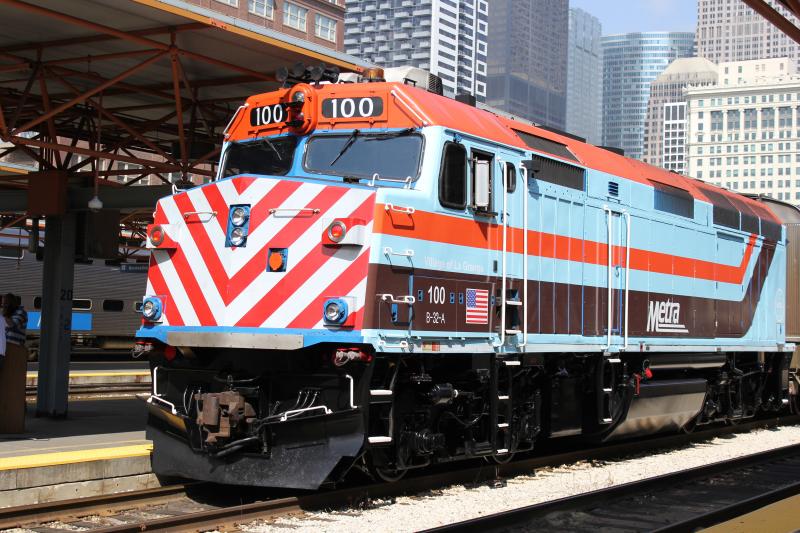Metra unveiled a special locomotive wrap on one of its F40PH locomotives today, commemorating 40 years of continuous passenger service for the locomotive model that is the backbone of Metra’s passenger fleet.

Metra CEO/Executive Director Don Orseno joined Metra Board Chairman Norm Carlson, incoming CEO/Executive Director Jim Derwinski, Metra staff and Bruce Nelson of the Shore Line Interurban Historical Society at Metra’s LaSalle Street Station to unveil the new wrap on Metra Locomotive No. 100.
“These F40PHs have been in commuter service longer than any other locomotive type in North America,” said Metra CEO/Executive Director Don Orseno. “Their longevity is both a tribute to the excellence of our maintenance program and a commentary on the need to provide public transportation systems with a level of capital funding that allows us to continually renew our assets.”
The wrap unveiled Thursday replicates the locomotives’ original RTA color scheme in recognition of the fact that Metra had not yet been created when the first F40PH locomotives entered service in Chicago on Sept. 30, 1977. The RTA’s Commuter Rail Division, which later became Metra, began taking delivery of the first 28 in 1977. Orders were subsequently placed four more times for a total of 115 locomotives, with the last delivered to Metra in October 1989. Over the years, Metra acquired three additional former Amtrak F40PHs for a total of 118.
The wrap, paid through the Shore Line Interurban Historical Society, was funded through private donors and a contribution by Progress Rail Corp.
"I’m not sure anyone could have predicted in 1977 that the locomotives then being delivered would still be in everyday use after four decades. Think about that – 40 years is a long time ago,” said Bruce Nelson of the Shore Line Interurban Historical Society. “How many people drive a 40-year-old car several hundred miles every day at speeds up to 79 miles per hour? The fact that this locomotive and its contemporaries continue to perform the same service for which they were built four decades ago is a testament to those who designed, constructed, operate and maintain them."
EMD, or the Electro-Motive Division of General Motors in LaGrange, Ill., developed the F40PH for passenger service. More than 500 of these locomotives were produced for the North American market. Metra would ultimately acquire 118 F40PH locomotives in various configurations, making it the world’s largest fleet of this locomotive type. The Metra system currently operates 149 locomotives with 28 being the original F40PH models.
“The stop-start nature of commuter service wears very hard on a locomotive,” said Metra Chairman Norm Carlson. “The fact that Metra’s Mechanical Department has maintained these locomotives to a standard that enables Metra to maintain a 95 percent on-time performance record month after month is impressive to say the least.”
One Metra employee has been with the F40PHs from the beginning. Bill Badurski, who currently oversees capital projects in Metra’s Mechanical Department, spent part of his early career at EMD. He served as EMD’s training center instructor, teaching railroads that had purchased the F40PHs how to maintain them.
“Forty years later, I am now charged with keeping these same units running for the foreseeable future,” Badurski said. “It’s pretty amazing when you think about how many miles of service these engines have seen.”
Most of Metra’s F40PH fleet have undergone in-house rehabilitation at Metra’s 47th Street shop. Beginning in 2008, 50 of the F40PH units underwent a more extensive overhaul by Progress Rail Services at their Mayfield, Ky., facility where these locomotives were essentially rebuilt. In 2015, a second overhaul program for the F40PH and F40PHM models started at Progress Rail’s Patterson, Ga., facility.
“These locomotives came into service the same year that the first personal computer was introduced to the public. Think of all the innovation and technological advancement that has occurred since then,” said Metra incoming CEO/Executive Director Jim Derwinski. “While it’s good to recognize what the F40PH has contributed to Metra’s reliability over the years, it’s also time to recognize that Metra is now providing this service with the equivalent of a classic car.”